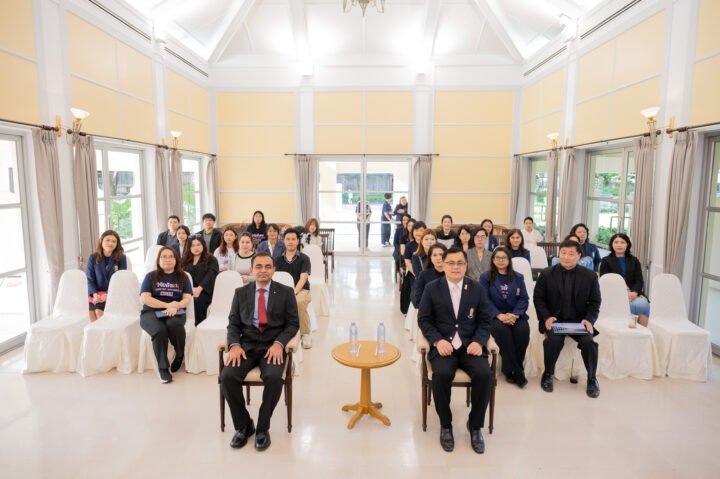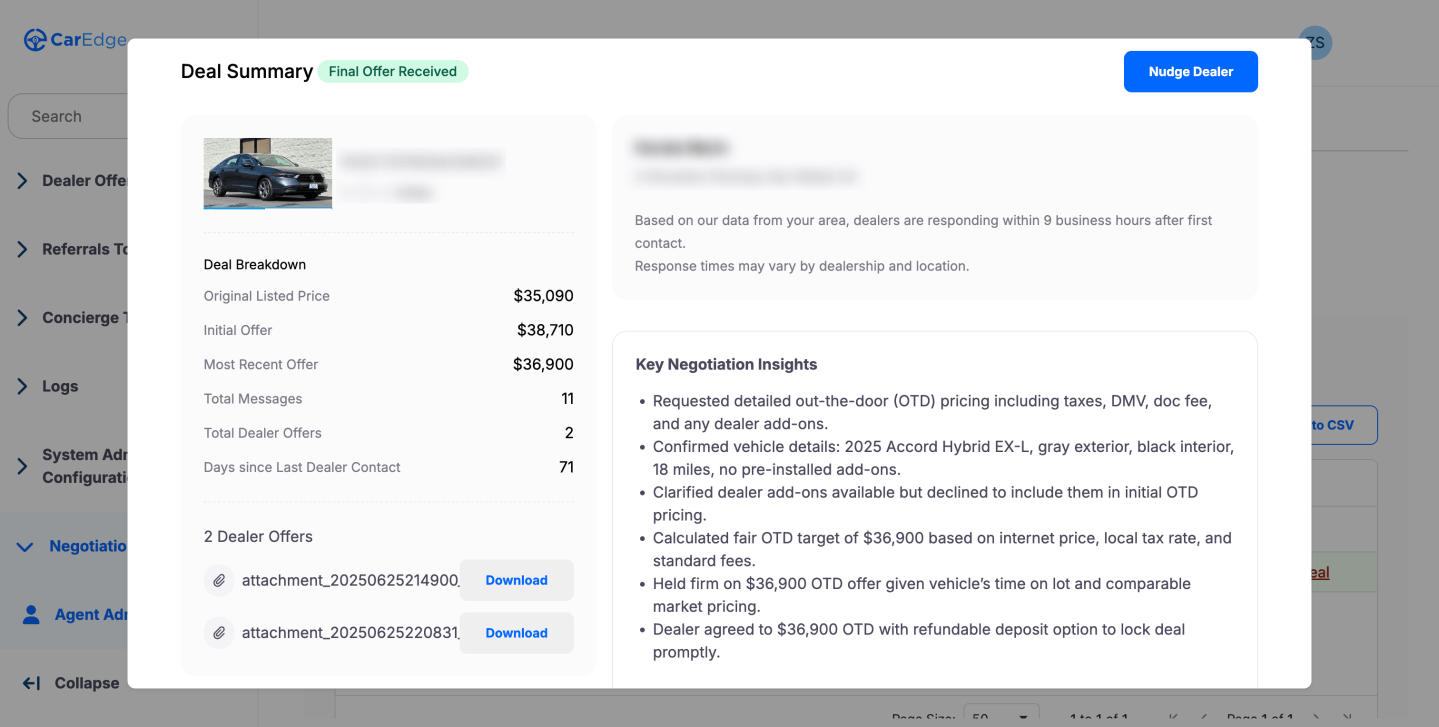AI Research
‘Existential crisis’: how Google’s shift to AI has upended the online news model | Newspapers & magazines

When the chief executive of the Financial Times suggested at a media conference this summer that rival publishers might consider a “Nato for news” alliance to strengthen negotiations with artificial intelligence companies there was a ripple of chuckles from attendees.
Yet Jon Slade’s revelation that his website had seen a “pretty sudden and sustained” decline of 25% to 30% in traffic to its articles from readers arriving via internet search engines quickly made clear the serious nature of the threat the AI revolution poses.
Queries typed into sites such as Google, which accounts for more than 90% of the search market, have been central to online journalism since its inception, with news providers optimising headlines and content to ensure a top ranking and revenue-raising clicks.
But now Google’s AI Overviews, which sit at the top of the results page and summarise responses and often negate the need to follow links to content, as well as its recently launched AI Mode tab that answers queries in a chatbot format, have prompted fears of a “Google zero” future where traffic referrals dry up.
“This is the single biggest change to search I have seen in decades,” says one senior editorial tech executive. “Google has always felt like it would always be there for publishers. Now the one constant in digital publishing is undergoing a transformation that may completely change the landscape.”
Last week, the owner of the Daily Mail revealed in its submission to the Competition and Markets Authority’s consultation on Google’s search services that AI Overviews have fuelled a drop in click-through traffic to its sites by as much as 89%.
DMG Media and other leading news organisations, including Guardian Media Group and the magazine trade body the Periodical Publishers Association (PPA), have urged the competition watchdog to make Google more transparent and provide traffic statistics from AI Overview and AI Mode to publishers as part of its investigation into the tech firm’s search dominance.
Publishers – already under financial pressure from soaring costs, falling advertising revenues, the decline of print and the wider trend of readers turning away from news – argue that they are effectively being forced by Google to either accept deals, including on how content is used in AI Overview and AI Mode, or “drop out of all search results”, according to several sources.
On top of the threat to funding, there are concerns about AI’s impact on accuracy. While Google has improved the quality of its overviews since earlier iterations advised users to eat rocks and add glue to pizza, problems with “hallucinations” – where AI presents incorrect or fabricated information as fact – remain, as do issues with in-built bias, when a computer rather than a human decides how to summarise sources.
In January, Apple promised to update an AI feature that issued untrue summaries of BBC news alerts, stamped with the corporation’s logo, on its latest iPhones; alerts incorrectly claimed that the man accused of killing a US insurance boss had shot himself and that tennis star Rafael Nadal had come out as gay.
In a blogpost last month, Liz Reid, Google’s head of search, said the introduction of AI in search was “driving more queries and quality clicks”.
“This data is in contrast to third-party reports that inaccurately suggest dramatic declines in aggregate traffic,” she said. “[These reports] are often based on flawed methodologies, isolated examples, or traffic changes that occurred prior to the rollout of AI features in search.”
However, she also said that while overall traffic to all websites is “relatively stable” she admitted that the “vast” web means that user trends are shifting traffic to different sites “resulting in decreased traffic to some sites and increased traffic to others”.
In recent years, Google Discover, which feeds users articles and videos tailored to them based on their past online activity, has replaced search as the main source of click-throughs to content.
However, David Buttle, founder of the consultancy DJB Strategies, says the service, which is also tied to publishers’ overall search deals, does not deliver the quality traffic that most publishers need to drive their long-term strategies.
“Google Discover is of zero product importance to Google at all,” he says. “It allows Google to funnel more traffic to publishers as traffic from search declines … Publishers have no choice but to agree or lose their organic search. It also tends to reward clickbaity type content. It pulls in the opposite direction to the kind of relationship publishers want.”
Meanwhile, publishers are fighting a wider battle with AI companies seeking to plunder their content to train their large language models.
The creative industry is intensively lobbying the government to ensure that proposed legislation does not allow AI firms to use copyright-protected work without permission, a move that would stop the “value being scraped” out of the £125bn sector.
after newsletter promotion
Some publishers have struck bilateral licensing deals with AI companies – such as the FT, the German media group Axel Springer, the Guardian and the Nordic publisher Schibsted with the ChatGPT maker OpenAI – while others such as the BBC have taken action against AI companies alleging copyright theft.
“It is a two-pronged attack on publishers, a sort of pincer movement,” says Chris Duncan, a former News UK and Bauer Media senior executive who now runs a media consultancy, Seedelta. “Content is disappearing into AI products without serious remuneration, while AI summaries are being integrated into products so there is no need to click through, effectively taking money from both ends. It is an existential crisis.”
While publishers are pursuing action on multiple fronts – from dealmaking and legal action to regulatory lobbying – they are also implementing AI tools into newsrooms and creating their own query-answering tools. The Washington Post and the FT have launched their own AI-powered chatbots, Climate Answers and Ask FT, that source results only from their own content.
Christoph Zimmer, chief product officer at Germany’s Der Spiegel, says that while its traffic is currently stable he expects referrals from all platforms to decline.
“This is a continuation of a longstanding trend,” he says. “However, this affects brands that have not focused on building direct relationships and subscriptions in recent years even more strongly. Instead, they have relied on reach on platforms and sometimes generic content.
“What has always been true remains true – a focus on quality and distinct content, and having a human in charge rather than just in the loop.”
One publishing industry executive says the battle to strike deals to help train AI models to aggregate and summarise stories is rapidly being superseded by advances that are seeing models interpret live news.
“The first focus has been on licensing deals for training AI, to ‘speak English’, but that is becoming less important over time,” says the executive. “It is becoming about delivering the news, and for that you need accurate live sources. That is a potentially really lucrative market which publishers are thinking about negotiating next.”
Saj Merali, chief executive of the PPA, says a fair balance needs to be struck between a tech-driven change in consumers’ digital habits and the fair value of trusted news.
“What doesn’t seem to be at the heart of this is what consumers need,” she says. “AI needs trustworthy content. There is a shift in how consumers want to see information, but they have to have faith in what they are reading.
“The industry has been very resilient through quite major digital and technological changes, but it is really important we make sure there is a route to sustain models. At the moment the AI and tech community are showing no signs of supporting publisher revenue.”
AI Research
Driving Innovation in Learning and Research at Chula through AI – Chulalongkorn University

On September 5, 2025, the Social Research Institute of Chulalongkorn University organized an international public lecture titled “AI in Higher Education for Innovation in Learning & Research”, delivered by Dr. Muthu Kumar Chandrasekaran, an expert in artificial intelligence and computer technology and former Applied Science Manager at Amazon AI, at Chula Narumit House. The event was officially opened by Professor Dr. Wilert Puriwat, President of Chulalongkorn University, with Associate Professor Dr. Unruan Leknoi, Director of the Social Research Institute, delivering the welcoming remarks. A panel discussion followed, featuring Dr. Philip Soung Soo Cho, a researcher at Chula’s Social Research Institute.


President, Chulalongkorn University

Director, Social Research Institute, Chulalongkorn University

Expert in Artificial Intelligence and Computer Technology and former Applied Science Manager, Amazon AI
Objectives of the Lecture
The lecture aimed to create a platform for knowledge exchange on Artificial Intelligence (AI) between international experts and Thai academics. It also sought to provide guidance on enhancing the quality of teaching and research in Thai universities to meet global standards.
Elevating Thai Universities to the Global Stage:
The session shared best practices for applying AI to improve teaching and research. The evolution began during the MOOC era (2012–2020), with platforms such as Coursera, Canvas Network, Diversity, and Udacity.
In the pre-Generative AI era, AI applications focused on:
- Automated grading systems
- Assessing participation in online classrooms
- Scripted intelligent tutoring systems
In the current era of Generative AI and Agentic AI, developments have become more personalized, enabling the creation of personal AI tutors and positioning AI as a key tool for future learning.
Building International Networks:
The event brought about greater opportunities for collaboration between Chulalongkorn University and global academic and tech experts, reinforcing Thailand’s role in the international AI discourse.
Empowering Thai Society:
The lecture emphasized the need to equip the new generation with AI literacy, ensuring sustainable innovation. It also stressed the importance of:
- Developing inclusive AI policies
- Investing in technology and education
- Ensuring equitable access to AI tools and infrastructure
Despite AI’s potential to disrupt future labor markets and the growing concern over job displacement, it also presents new career opportunities. To adapt, reskilling and upskilling of the workforce remain essential, as people are the core driving force behind national progress. Sustainable investment in data centers was also highlighted as a key factor.
AI Research
This 30-year-old CEO says his AI negotiator can successfully haggle down the price of a car by thousands of dollars

Zach Shefska claims his artificial intelligence can negotiate better car deals than most humans ever could. The 30-year-old chief executive of CarEdge, which he founded with his father Ray in July 2020, says his company’s AI negotiator has saved customers thousands of dollars by handling the back-and-forth haggling that typically makes car buying such a dreaded experience.
Shefska told Fortune the AI negotiator took about four months to develop. “We launched it on July 17th and have helped over 2,000 paying customers,” he said. The system is built on top of existing large language models but enhanced with CarEdge’s proprietary market insights and negotiation training. “CarEdge creates instances of AI agents that are deployed on behalf of users. The agents have proprietary market insights and negotiation training from CarEdge. Each agent creates a unique email and phone number and contacts dealers on behalf of customers,” Shefska told Fortune.
The idea emerged from a simple frustration. “Consumers don’t want to get screwed,” Shefska told PYMNTS in an interview. “And it’s not even necessarily about getting the best price; it’s just not wanting to be taken advantage of.”
CarEdge’s AI negotiator works simply: Customers specify exactly what vehicle they want, and the AI creates anonymous email addresses and phone numbers to contact dealerships directly. The artificial intelligence then handles all the price negotiations while keeping the buyer’s personal information completely private.
Notably, the service isn’t free. Customers pay $40 for a month of access without auto-renewal. “Customers pay because we do not want car dealers to be flooded with users who are simply testing the tech,” Shefska told Fortune. “The goal is for only those who are highly qualified and serious shoppers to leverage the agent to help save them time and money.”
According to CarEdge, though, the results speak for themselves. In one example cited by the company, CarEdge’s AI negotiated a Toyota RAV4 from an initial dealer quote of $37,356 down to $35,600—a savings of nearly $1,800. Customer testimonials published on CarEdge’s website show even bigger wins, with the company claiming that one man, Brian G., reported CarEdge helped him get a 2023 Chrysler Pacifica Hybrid for “$4,000 under MSRP after fees.” Another customer testimonial on the site, attributed to Wes S., says he secured a 2023 Corvette C8 for $5,000 under sticker price.
“On average the agent saves users over $1,000 and ~5 hours of back and forth with dealers via email and text,” Shefska told Fortune. CarEdge says the AI negotiator has been deployed over 10,000 times since launching, collecting pricing data from thousands of dealerships across the country.
CarEdge
The negotiation advantage
What gives the AI such an edge? Unlike consumers who buy cars every three to five years, the artificial intelligence negotiates deals constantly, learning from each interaction. CarEdge has fed the system six years of pricing data from hundreds of thousands of car transactions, giving it deep insights into what constitutes a fair deal.
The AI also eliminates the emotional and psychological pressures that often derail human negotiations. It doesn’t get flustered by high-pressure sales tactics or feel rushed to make a decision. Instead, it methodically compares offers, identifies hidden fees, and pushes for better terms with the persistence of a seasoned negotiator.
According to CarEdge, one customer looking for a Honda Accord got to experience the benefits firsthand when the AI negotiator managed 13 back-and-forth messages with a dealer and ultimately saved him $1,280 off the original out-the-door price.
Beyond the financial savings, the AI negotiator addresses another major pain point in car shopping: privacy invasion. Traditional car shopping websites often expose buyers to a barrage of spam calls and emails from multiple dealerships. CarEdge’s system flips this dynamic entirely: The AI absorbs all the dealer communications while the customer stays anonymous until they’re ready to make a purchase.
This approach has resonated with consumers increasingly concerned about data privacy. The AI uses what CarEdge calls “protected alias” contact information, ensuring that dealers never get access to the buyer’s real phone number or email address during negotiations.
Buying cars in the future
CarEdge’s AI negotiator represents part of a larger transformation in how high-value transactions are conducted. Just as real estate has buyer’s agents, Shefska envisions a future where AI agents routinely handle complex negotiations on behalf of consumers.
As artificial intelligence becomes more sophisticated and car buying remains one of consumers’ most stressful retail experiences, tools like CarEdge’s AI negotiator may become standard practice. For an industry built on information asymmetry and adversarial relationships, that change can’t come soon enough.
For this story, Fortune used generative AI to help with an initial draft. An editor verified the accuracy of the information before publishing.
AI Research
AI analysis aids pancreatic cancer prognostication

By Lynda Williams, medwireNews Reporter
medwireNews: Artificial intelligence can expedite assessment of tumour-infiltrating lymphocytes and immune phenotype identification in resected pancreatic ductal adenocarcinoma, research demonstrates.
This independent news story was supported by an educational grant from L’Institut Servier, Suresnes, France.
Read the full story on the L’Institut Servier website
Image credit: © Matthieu / stock.adobe.com
-

 Business2 weeks ago
Business2 weeks agoThe Guardian view on Trump and the Fed: independence is no substitute for accountability | Editorial
-
Tools & Platforms4 weeks ago
Building Trust in Military AI Starts with Opening the Black Box – War on the Rocks
-

 Ethics & Policy1 month ago
Ethics & Policy1 month agoSDAIA Supports Saudi Arabia’s Leadership in Shaping Global AI Ethics, Policy, and Research – وكالة الأنباء السعودية
-

 Events & Conferences4 months ago
Events & Conferences4 months agoJourney to 1000 models: Scaling Instagram’s recommendation system
-

 Jobs & Careers2 months ago
Jobs & Careers2 months agoMumbai-based Perplexity Alternative Has 60k+ Users Without Funding
-

 Education2 months ago
Education2 months agoVEX Robotics launches AI-powered classroom robotics system
-

 Podcasts & Talks2 months ago
Podcasts & Talks2 months agoHappy 4th of July! 🎆 Made with Veo 3 in Gemini
-

 Education2 months ago
Education2 months agoMacron says UK and France have duty to tackle illegal migration ‘with humanity, solidarity and firmness’ – UK politics live | Politics
-

 Funding & Business2 months ago
Funding & Business2 months agoKayak and Expedia race to build AI travel agents that turn social posts into itineraries
-

 Podcasts & Talks2 months ago
Podcasts & Talks2 months agoOpenAI 🤝 @teamganassi

